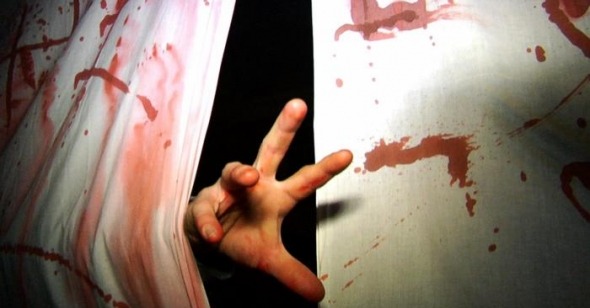Haunted House
by Michael Koresky
October Country
Dir. Michael Palmieri and Donal Mosher, U.S., Wishbone Films
The type of introspective, intimate domestic American nonfiction that has sprouted up so much in art-house theaters in the wake of the success of Capturing the Friedmans has come to typify documentary filmmaking of the past decade. Itself somewhat of an acolyte of the far more sensitive Crumb, which at least foregrounded its inevitable grotesquerie, Andrew Jarecki’s sensational depiction of an upper-middle-class Jewish family torn apart by intimations of child molestation tried to pass off its essentially exploitative nature as an investigation into American suburbia. Plus, with its tacked-on faux reconciliation ending and lack of aesthetic engagement, the film played as more of a very special 20/20 episode. Filmmakers Michael Palmieri and Donal Mosher correct Jarecki’s inelegance with their surprisingly stirring new film October Country, a visually remarkable and thematically unpretentious peek behind the doors of one upstate New York family.
The fact that the clan in question is that of co-director and photographer Mosher makes October Country much less patronizing than it might have been, as well as situates it somewhere in the high end of the subgenre of personal diary films (think Jonathan Caouette’s Tarnation). Mosher, however, does not make himself a character. Instead he surveys with detached beauty and expressive melancholy all the other members of the working-class family, creating a multigenerational portrait of cycles of disappointment and frustration. There’s no one dreaded event lying at the heart of the film, which instead casually captures twelve months in the Moshers’ existence, from one Halloween to the next, through interviews and voice-over touching upon the years of custody battles, abandonment, financial woes, and war scars the family has endured. Rather than trumping up any of this as uncommon tragedy, October Country pensively takes them as givens.
It’s to the great credit of Mosher and his collaborator and partner Palmieri, a music-video and commercial director, that each of the family members are depicted with grace and genuine fascination: there’s matriarch Dottie, big-hearted yet naive and helpless in the face of years of her children’s bad choices (and an unrepentant foster mom to the increasingly wayward problem child Chris); dad Don, a reticent Vietnam veteran and former policeman; daughter Donna, a single mother with two children, the older of whom, Danael, already has lost custody of her own baby; the younger, the prepubescent Desi, has a good nature and almost preternatural gift for zeroing in on her family’s emotional deficiencies, evidence that she might end up well-adjusted. Especially inspiring is the filmmakers’ treatment of Denise, Don’s estranged sister, a fiercely idiosyncratic woman whose spiritual fascination with Wiccan practice has made her something of an outcast and persona non grata to Don; Mosher and Palmieri respectfully downplay the oddness of her bearing and behavior (she’s often seen trying to commune with ghosts in graveyards, dressed like a classic witch), instead focusing on the sadness of her communication breakdown with the rest of the family.
The people onscreen are uniformly engaging, but unlike so many other creators of these personal docs, Mosher and Palmieri wisely know that may not be enough. With their backgrounds in visual arts, the directors are confidently able to use the crisp digital video imagery to maximize their subject’s expressive potential. Gorgeous vibrant reds and blues stand out against inky blacks, the autumnal landscapes and summer fireworks become abstract backdrops for the family’s quiet struggles. The eerie Halloween atmosphere is perhaps the film’s most consistent motif, and while the filmmakers might occasionally overplay their hand a bit (the seasonal skull and spirit decorations make for a rather obvious externalization for such haunted inner lives), the results are vivid and occasionally purposely disorienting. October Country evokes a troubled suburbia, teeming with ghosts, visible and not.
